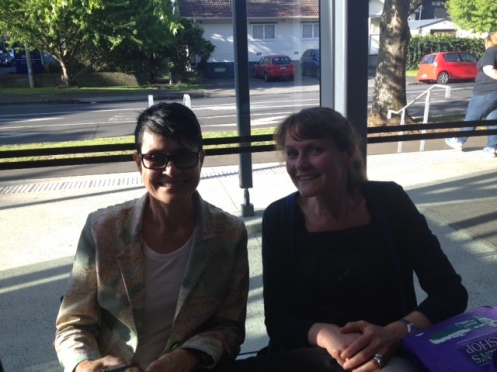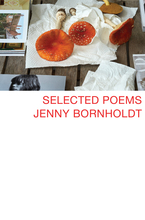
The Ladies’ Litera-Tea is an annual event organised by bookseller taonga, Carole Beu, and the Women’s Bookshop: eleven authors, a full auditorium and an excellent afternoon tea with delicious cakes and savouries. It usually lasts about five hours if you include the book signings. I always come away with a bag of new books, often unexpected choices.
This year I felt like I was walking the fine line between voice and no-voice, with a fuzzy head and a sway that wasn’t to do with reading poems on stage. Luckily I was third up so delivered my poems and then sat back to listen. Usually I take notes to replay on my blog but all I seemed to do was doodle as a counterbeat to the feasts of words.
My head isn’t up to scholarly focus today so I am in bed blogging and reading.
Not sure why there were so many doodle birds. Birds were barely mentioned. Apart from Billy Bird. Or hats. Apart from the steampunks and their creative shed and steampunk hats.

First up was Catherine Chidgey talking with exquisite clarity about her new novel, The Wish Child. I loved the way she made something of obstacles and detours and can’t wait to read the book. Next up Helene Wong talking about: Being Chinese: A New Zealand Story. This is also on my must read list. It feels like essential reading particularly in view of the enduring racism Helene faces.

Helene Wong and Marilyn Jessen (Marilyn went on a road trip tracking creative spaces)
Helene recounted an anecdote that resonated (with a few details missing). She was at an undergraduate Chinese paper with a fairly indifferent bunch of students. The white middle-aged bloke started reading a poem in Cantonese. Helen was captivated by the undulating pitch and tones despite not understanding a word. She was struck by this ordinary white man’s pleasure in the Chinese language. His ‘gesture of respect astounded’ her. She almost ‘wept in gratitude’ that he showed so clearly Chinese culture is not to be ashamed of.

Emma Neale and Paula Green
There is no right formula for authors on stage – especially in view of what to say. I can go either way – just hearing the work or also hearing anecdotes and inroads into the writing experience can hit the spot. I loved the way Emma Neale talked about lexical exhaustion on completing a novel. She borrowed a quote from a musical composer who replayed his piece when asked to explain his work. Emma said she had decided to let the extracts do the talking. I agree with Emma on ‘the joyous creative anarchic energy’ of Billy, the central character of her new novel, Billy Bird. I have just finished this book and it is a top fiction read for 2016. So beautifully written, so moving, so funny, so gobsmackingly good.
The very lovely, very inspirational, Yael Shochat wrapped up the first half. She was celebrating the arrival of Ima Kitchen. I was hooked on the video of grandmothers in the kitchen in Israel making lunch. At half time, the queue for Ithe cookbook never stopped. Both cafe and book are terrific additions to Auckland’s eclectic food scene. We have had such a wide cultural culinary seasoning for decades and it adds so much to who we are as a city. When I arrived back from London in the 1980s my tastebuds were popping. Will be cooking out of this book tonight!
a f t e r n o o n t e a interlude was worthy of a n a f t e r n o o n t e a p o e m
sweet lamington and asparagus roll
the poem unfolds like spanikopita
spinachy peppery cream on the tongue
(thanks Yael, so delicious)
A long time fan of Kerrin P Sharpe’s poetry it was such a treat to hear her read for the first time. I adore the mother poems in her new book, Rabbit Rabbit – the audience did too as it was oohs and aahs and beautiful (just as I heard after the lyrical fiction of Emma Neale). I also loved the entry points gave into the book as it provided me with new discoveries.
Having recently (two posts back maybe!) gushed to you about Ashleigh Young’s witty debut collection of essays, Can You Tolerate This?, a highlight was hearing her read. She selected a section from ‘Big Red.’ I have quoted several times from this essay, so it felt like a favourite album was playing and I was word perfect. Wonderful!

Emma Neale and Gina Cole (in the 6pm shadows!)
I was hooked on Gina Cole’s ancedotes, lucidity, warmth and story extracts all pivoting on the “L” word: lighthouses, law, literature. Her new book, Black Ice Matter, went in my shopping bag! I want to post about this soon!

Janice Marriot’s book on Grandparents Talk also went in my shopping bag. It was good to meet a poet who has writtn some of my favourite poems in the Treasury!
Finally a dose of laughter. Urzila Carlson used her new book, Rolling with the Punchlines, to deliver a stand-up routine/reading/musing/confession that was pure gold. Like most of us she was anxious about following on from people so much wittier or funnier or more erudite. She says it best. She had been hearing all this writing that was ‘like warm honey in your mouth and too good to swallow.’ She then compared it to an effervescent something on the tongue [and then a riff on that]. ‘Holy shit,’ she says ‘What am I doing here? I should leave. I should say I’ve got to get a flight with Ashleigh.’ But then she had us in fits of laughter, tears streaming for twenty minutes, with a few piercing moments of inbreath and gasp at something sad or hard to talk about. Such a tonic.


It was a rollercoaster occasion: warmth, ideas, humour, sad things, happy things, connections. I think I came home with six new books.
Thanks Carole and the Women’s Bookshop – it was a very happy audience.



















